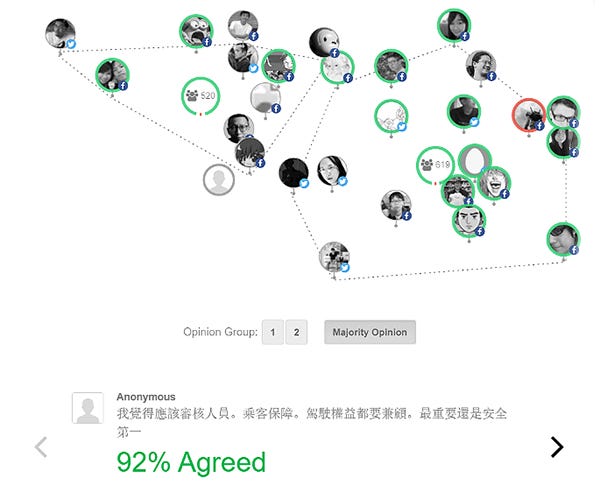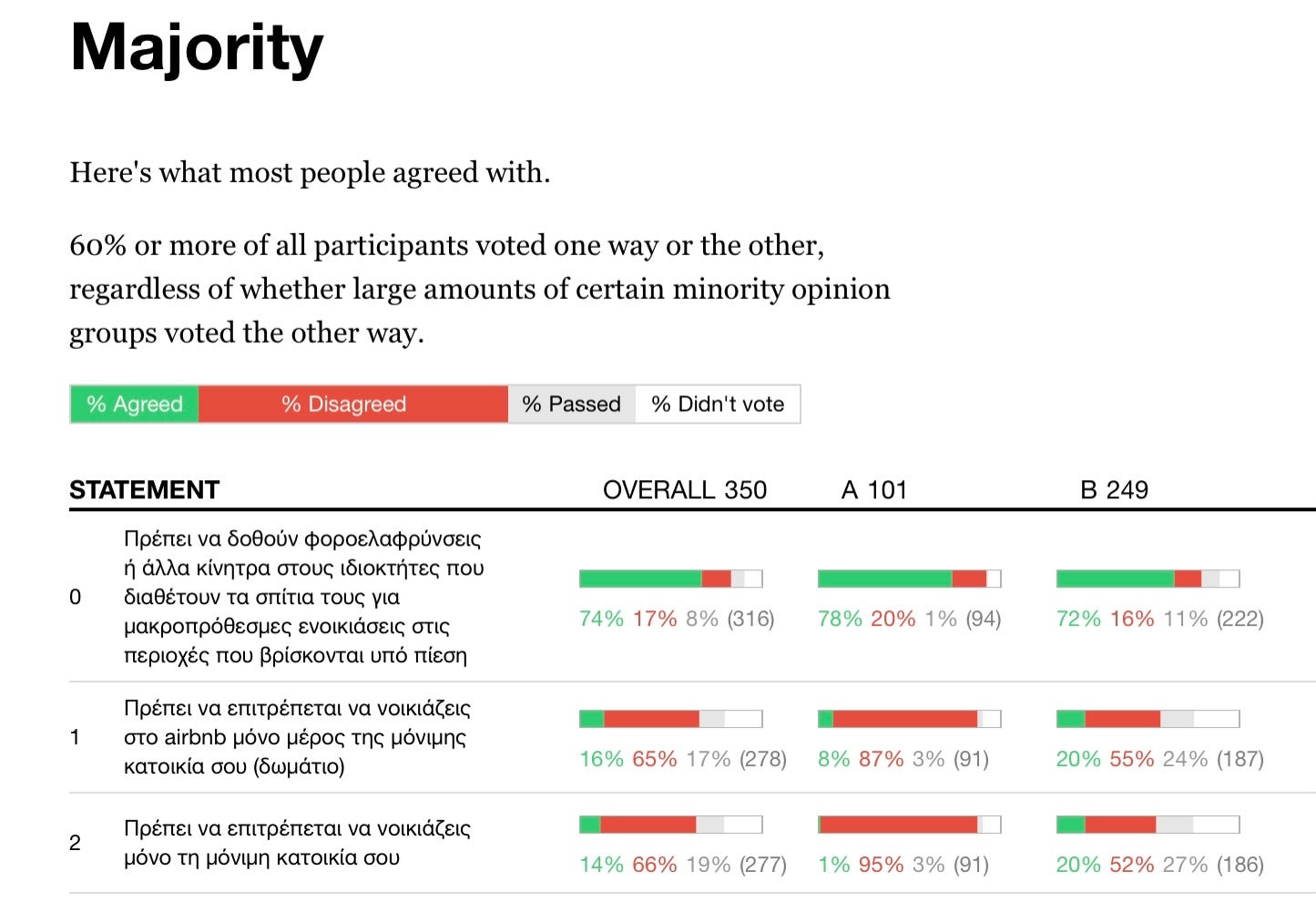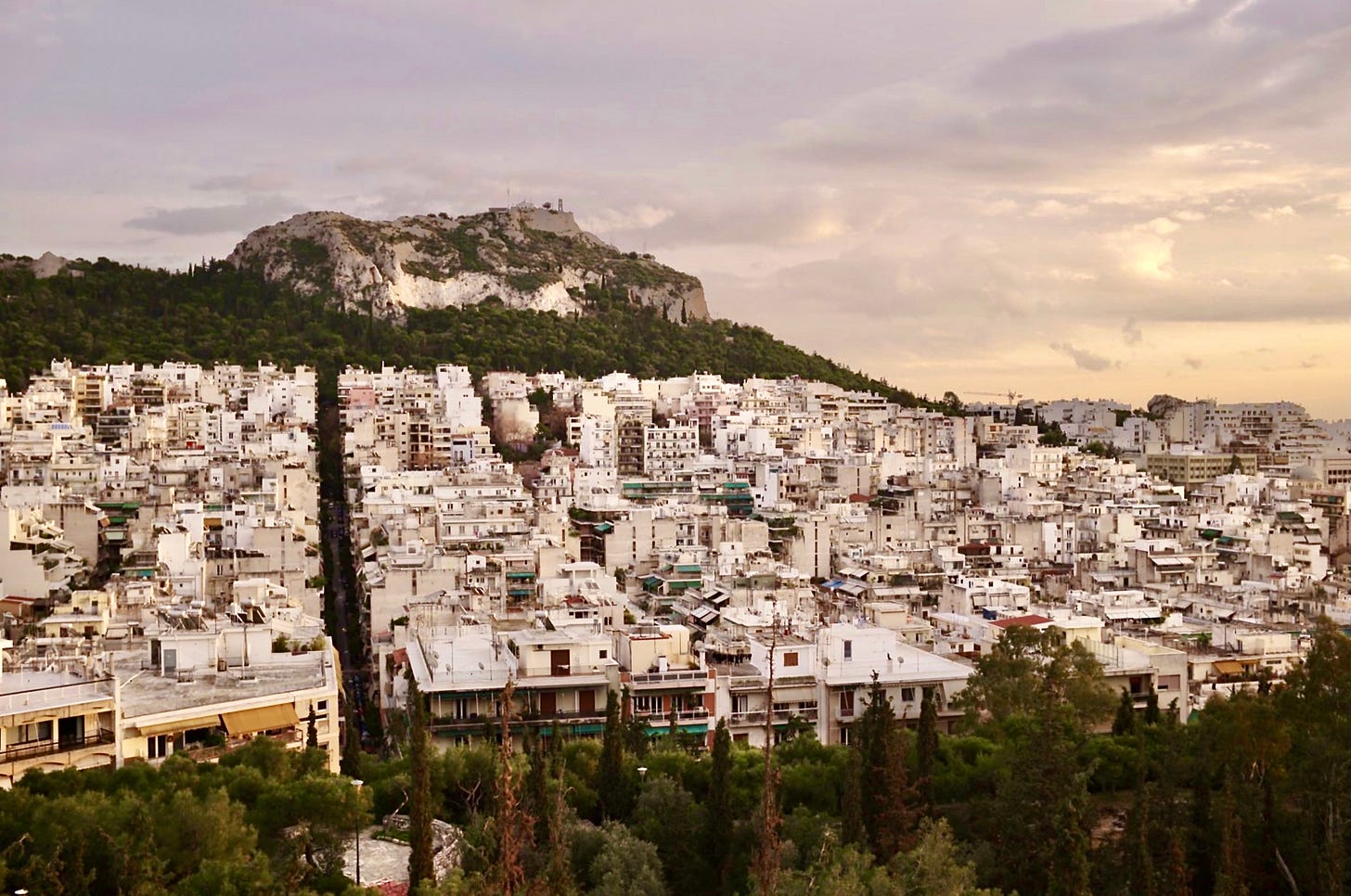Welcome to a new issue of Changing Greece.
This week, I am very pleased to announce that we have
writing the cover story. Adam is the former founder of Kineocity, current head of Kosmoride and co-founder of Astylab, a Greek initiative to improve city life through human-centred design and innovation.Adam is an expert in all things pertaining to sustainability, mobility and urban affairs. He has been running the top Greek newsletter on these topics for almost three years.
Adam and his team at Astylab are currently running a public discussion project about Airbnb in Greece. I find this experiment a necessary but also ingenious way of discussing one of the hottest topics of city life in the country, which is why I invited Adam to tell us more about it today.
Enjoy!
A PUBLIC CONVERSATION ABOUT AIRBNB IN GREECE
by
What can Greece learn from Taiwan?
In 2013, Uber started operating in Taiwan, causing controversy similar to what ended up happening in Greece.
To decide on fair rules for Uber, Taiwan used a new method called vTaiwan, involving public participation. This four-week process engaged 4,500 people, resulting in six main points with over 80% agreement.
These points set the stage for further discussions including academics, experts, citizens, and various stakeholders. From these talks, specific suggestions were made and turned into a draft law for parliament. Due to widespread agreement and public pressure, Uber agreed to most of these suggestions even before they became law.
A digitally-powered, public deliberation process
The process used a tool called polis. This tool uses advanced statistics and ML techniques to quickly understand and analyze the thoughts of large groups of people, directly from their own words.
Polis is an open-source software that has been utilized globally by governments, academics, media, and citizens.
Its primary purpose is to extract ideas from a large number of people and identify shared values and preferences. The focus is on finding existing common ground (coherence), rather than trying to make people agree on something (convergence).
Polis is a tool for consultation, helping to set the agenda of a discussion while the problem is still being outlined.

The Greek Airbnb conversation
We want to explore if a similar process can be used to inform how best to regulate Airbnb in Athens and Thessaloniki, the two largest cities in Greece.
This question is increasingly important due to three key issues:
A significant lack of affordable housing. By the end of 2020, central Athens had 15,837 Airbnb units and Thessaloniki had 5,388. For every traditional rental apartment, there were 19 Airbnb listings.
The high concentration of Airbnb properties in certain neighborhoods is impactful. Tourists, like many of us when traveling, choose to stay in central locations near monuments, museums, and metro stations. This trend makes these areas even more expensive for local residents and alters their local character.
The issue of classifying Airbnb rentals as urban instead of tourism rentals. This affects landlords’ duties and tax responsibilities, while raising questions of fairness.
Various cities have adopted different strategies to manage Airbnb. These include outright bans, imposing restrictions, distributing Airbnb properties more evenly across different neighborhoods, or taxing them similarly to hotels.
To determine the best strategy for Greece, we should aim to find common ground and build consensus. By identifying and agreeing on our shared values and preferences, we can make policy decisions that are less controversial and more widely accepted.

What outcomes can we hope for?
Regardless of whether this process can directly influence Airbnb regulations in our Greek cities, the lessons we might learn from this process are particularly valuable.
A crucial aspect is citizen participation. Considering that 92% of citizens express caution towards others and only 27% voted in the country’s largest municipality election, will they engage in this process?
By adopting a new approach, we might see how opening up decision-making to wider public participation and increasing transparency in the legislative process could work. This could give us insights into the potential benefits of greater citizen involvement in such matters.
On top of that, as we achieve this specific and rudimentary unity, we might realize that our differences are not as big as we initially thought.
Using technology that aims to unite us rather than divide and induce conflict might prove to be a refreshing change. Through this process, we could finally start focusing on what brings us closer together, rather than what separates us.

🙌 PROOF THAT GREECE IS CHANGING
Electric vehicles (EVs) and public charging points are rising exponentially in Greece. After years of being a laggard in the electric mobility trend that has taken up the rest of the world by storm, Greece is now finally joining the EV revolution at top speed.
Plug-in Hybrid EVs (PHEVs) use batteries to power an electric motor and another fuel (e.g. gasoline) to power an internal combustion engine. Battery EVs (BEVs) are only powered by an electric battery and have no gas engine parts. Both PHEVs and BEVs are increasingly found in Greece, but PHEVs still dominate the market.
Today, you are as likely to see a Tesla in the rich suburb of Glyfada in Southern Athens as you are to see one parked at the once infamous anarchist den of Exarcheia, or even in the dusty single road of the small island of Ano Koufonisi — all examples based on true sightings over the past year.
With recent legislation by both Greece and the EU that makes it harder for new conventional cars to be sold or driven in cities, it will be interesting to see how the EV trend will continue over the next few years.
🌿 URBAN AFFAIRS & SUSTAINABILITY
New micromobility experiment in Crete. Smart urban cyclist hubs have been set up and are ready to undergo a “test before invest” period in the city of Heraklion. A necessary initiative at a time when pollution in the beloved Cretan city is rising fast.
How walkable is the city of Amsterdam? The new project co-created by Vasileios Milias, PhD Candidate in the Urban Analytics Labs of TU Delft, uses open data to answer the question. I wish we had a similar map for the biggest Greek cities too.
ISLANDS is a new international joint research Master programme of University of Groningen, University of Aegean, University of Iceland and University of Las Palmas de Gran Canaria. A fantastic idea and curriculum. Scholarships are available too.
KOΛEKTIVA for social innovation, culture and sustainable development. A non-profit organisation that encourages positive transitions to fair and viable futures.
Seasoned journalists launch Sustainable Cyclades initiative. A new journalistic project focusing on key issues faced by the tourist-favorite North Aegean islands.
🤯 DID YOU KNOW…
Athens is host to tens of amazing libraries, both public and private. This is the city’s secret treasure trove. If you love getting lost in books, or even better, in libraries full of books, you should definitely explore some of them next time you’re in town.
Until next time!








Great to see Vasilis work mentioned as well! He's also one of the founding members of Astylab and we are discussing how we could bring his work to Greek cities.
Wow, what a great way to involve the public in public decisioning! Well done, Adam!